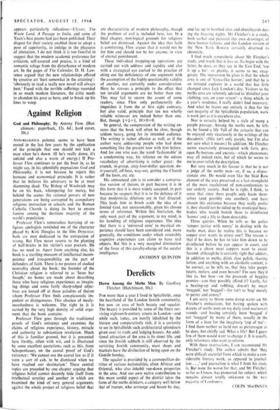Derelicts
Down Among the Meths Men. By Geoffrey Fletcher. (Hutchinson, 30s.) FOR more than a year I lived in Spitalfields, once the heartland of the London Jewish community, but now an area of both beauty and squalor. The beauty is provided by some of the finest sur- viving eighteenth-century streets in London—and while such, today, are mostly inhabited by the literate and comparatively rich, it is a curiosity to see in Spitalfields such architectural splendours given over to trade and lodging houses.' An addi- tional attraction of the area is its street life, and since the Jewish sabbath is still observed by the surviving Jewish community, most shops and markets have the distinction of being open on the Gentile Sunday.
The squalor is provided by a cosmopolitan de- tritus of various nationalities, often African and Oriental, who also inhabit run-down properties in the area. And our own native contribution to this more sordid aspect of the district takes the form of the meths drinkers, a category well below that of tramps, who scrciunge and booze by day, and lay up in bombed sites and churchyards dur,. ing the freezing nights. Mr Fletcher's is a study, both verbal and pictorial this own drawings), of these human failures, and this London version of the New York Bowery certainly deserved its chronicle.
I find much sympathetic about Mr Fletcher's study, and much that is less so. To begin with the latter, he does, as they say in the East End, 'top it up a bit'--or plainly, it seems to me, exag- gerate. The impression he gives is that the whole area is one of 'Goya-like horror,' and that he is an intrepid explorer in a world that has little changed since Jack London's day. Visitors to the meths area are solemnly advised to 'disinfect your clothing, too, on your return'—a thing which, in a year's residence, I really didn't find necessary. And what he leaves out entirely is that for the vast majority of the Spitalfields population, work is work just as it is anywhere else.
Nor is veracity helped by a style of many a purple passage. Among the meths men, he tells us, he found a life 'full of the zeitgeist that can be enjoyed only vicariously in the writings of the decadents.' (This isn't only purple, but I'm also not sure what it means.) In addition, Mr Fletcher seems excessively preoccupied with farts, piss, open fly-buttons and excreta—which phenomena may all indeed exist, but of which he seems to me to over-relish the description.
But very much in his favour is that he is not a judge of the meths men—or, if so, a dispas- sionate one. He would even like the Skid Row element of the area preserved as a last stronghold of the most recalcitrant of non-conformists to our orderly society. And he is right, I think, to sense that since these people only harm them- selves (and possibly one another), and have chosen this existence because they really prefer it, they should not be tidied up by municipal busy- bodies who would banish them to disinfected 'homes' and a life to them detestable.
Three queries. When he tells us the police 'temper justice with mercy' in dealing with the meths man, does he realise this is because no copper ever wants to arrest one? The reason is that if he does, he has to take him down to be disinfected before he can appear in court, and this is a chore most coppers want to avoid. Second: although he is certainly right that addicts, in addition to meths, drink shoe polish, shaving lotion, and anything with an alcoholic content, is he correct, as he tells us, that they take purple hearts, reefers, and even heroin? I'm sure they'd like to, but how—on the proceeds of begging pennies—can they possibly afford it? Lastly, for a beating-up and robbing, doesn't he mean 'mugged,' not 'bugged--for isn't to 'bug' merely to pester and annoy?
I am sorry to throw some damp water on Mr Fletcher's enthusiasm, but having spoken with dozens of meths men on my daily (and nocturnal) rounds—and having certainly been 'bugged' if not 'mugged' by many of them, usually in the form of a loan for the imaginary 'cup of tea'— I find them neither as lurid nor as picturesque as he does, but chiefly sad. What a life! But I guess few of them would want to change it. It is usually only reformers who want to.reform.
With these reservations, I can recommend Mr Fletcher's study. The author admits that 'they were difficult material from which to make a con- siderable literary work, as opposed to journal- ...,' and journalism is what I think his study is. But none the worse for that, and Mr Fletcher, so far as I know, has pioneered the subject, which remains almost totally unknown to the vast majority of Londoners.
COLIN MAc1NNES






























 Previous page
Previous page